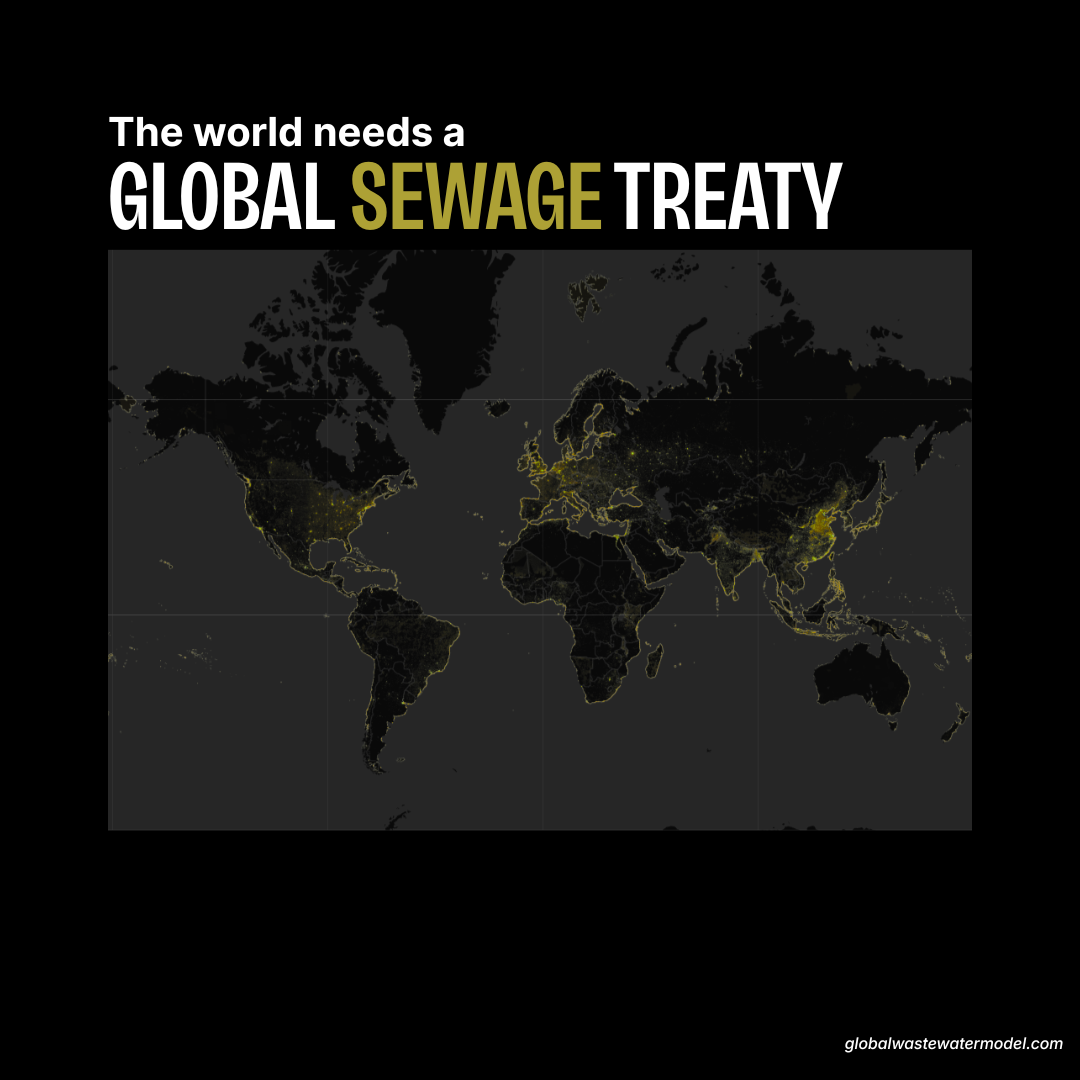Looking back at 2025, it feels like many of us have been a tennis shoe in a dryer, getting knocked around and left to dry out.
.png)
Executive Director
We’ve seen many of our friends and colleagues at EPA, NOAA, and other agencies lose their jobs, their research, and our partners within the alliance lose funding for critical projects and programs. We’ve seen the US pull out of the Paris Climate Agreement and countless other assaults on environmental and public health protections. Internationally, we watched the chaos of the plastics negotiations falling apart, while at the same time living through the third warmest year on record with global carbon emissions set to be the highest ever recorded.
At OSA, we are used to dealing with 💩, and this year we’ve seen a lot.
At the same time, OSA has stabilized, grown, and launched a campaign for a Global Sewage Treaty. We published our first-ever analysis and report detailing the economic impacts of sewage and wastewater pollution in conjunction with the Economist Impact Group, calculating losses globally of over four trillion dollars annually due to sewage and wastewater pollution, garnering international press. We grew our alliance and welcomed five incredible new Steering Committee members. We hosted webinars for our alliance and wider stakeholder network on forever chemicals with leading experts in the field, such as 3M whistleblower Dr. Kris Hansen, and organized a webinar focused on the Indigenous Roots of Circularity, centering the knowledge of Indigenous scholars and leaders like Dune Lankard from the Native Conservancy. We were fortunate to present at the UN Ocean Conference (UNOC) and the World Ocean Summit. Behind the scenes, we worked with partners and other key stakeholders to better understand how OSA can create more meaningful impact and support our coalition.
As I look toward 2026, I am focused on gaining momentum and working to make our dream of a Global Sewage Treaty a reality (which you can read about later in this report). This work will be a new course for OSA, and we are excited to learn and grow through this process. After our launch at UNOC in June, we’ve been fortunate to bring in endorsements and gain critical expertise on how to make a Global Sewage Treaty happen. I’ve been humbled by the high-level environmental leaders, ministers, and other nonprofits taking on this cause. I continue to be grateful for our incredible staff, Steering Committee, and partners who will help us bring this movement into reality. Full steam ahead!
Growing Our Network
OSA is excited to welcome eight visionary organizations to our global coalition in 2025. From harnessing the power of AI from space to fostering deep, personal connections to water in our daily lives, this diverse group of partners brings a powerful and multifaceted range of solutions to the fight against ocean sewage pollution. Their collective expertise in technology, community mobilization, circular design, and workforce development marks a significant leap forward in our shared mission. Together, we are strengthening every link in the chain—from prevention and monitoring to restoration and recycling—to create a cleaner, healthier ocean for all.
"We are absolutely thrilled to welcome this incredible cohort of partners to the Alliance,” said Jasmine Fournier, OSA Executive Director. “The diversity of expertise—from cutting-edge technology and circular design to deep community engagement—is truly inspiring. This isn't just an expansion; it's a powerful acceleration of our collective ability to protect our oceans. I am deeply grateful to each of these organizations for joining this critical mission, and I cannot wait to see the waves of positive change we will create together."
.png)
Reaching New Audiences
In 2025, OSA expanded its reach, bringing sewage and wastewater pollution to new and influential audiences worldwide. We demonstrated that solving the sewage crisis is integral to ocean health, economic stability, and a regenerative future.
At the United Nations Ocean Conference, our two dynamic, solutions-driven sessions on coastal resilience and coral reefs tackled hard truths about barriers to progress. In a bold campaign, we launched our Action Pledge for a Global Sewage Treaty by placing compelling messages in conference bathrooms, ensuring our message reached delegates directly and memorably.
To calculate the costs of inaction, we launched “The Scourge of Untreated Wastewater” at the World Ocean Summit. By translating sewage pollution into a staggering $19.6 billion in annual losses across key economies, we made an undeniable financial case for urgent investment.
Our message reached experts working at the intersection of climate and food as Jasmine attended The Climate Underground conference. Hosted by Al Gore and Alice Waters, this event positioned wastewater solutions within the critical dialogue on regenerative agriculture, connecting with farmers, investors, and policy leaders.
We bridged communities of knowledge by convening a webinar on the “Indigenous Roots of Circularity,” which elevated the voices of Indigenous scholars for water managers and policymakers. Simultaneously, our expert panel on “Advancing PFAS Safety for Public Health & Resource Recovery” co-hosted with The Nature Conservancy, translated complex science into actionable insights, engaging public health officials and utility managers on the urgent need for source control.
Finally, our Earth Day partnership with Community Document Night and EcoOwls fostered dialogue, using the powerful film “Crapshoot” to educate and raise awareness, building a broader, more informed base of support for our vital mission.

Advancing Our Goals
The centerpiece of our ambition is the campaign for a Global Sewage Treaty. As detailed in the economic report, sewage is a transboundary crisis that harms marine ecosystems, fuels biodiversity loss, and costs the global economy trillions. A binding international framework is the only mechanism that can mobilize the attention, cooperation, and funding necessary to solve this problem at scale. We are building a coalition of champions to bring this treaty to the UN stage. If you're thinking, 'Why do we need a Global Sewage Treaty?', we've got a answer to that.

Sparking Global Conversation
OSA ignited a vital global conversation on sewage pollution, driven by the launch of our landmark report, The Scourge of Untreated Wastewater. Our findings were picked up by major news outlets and influential podcasts, demonstrating the growing urgency of this issue.
The report’s revelations on economic losses garnered significant attention in Forbes, Smart Water Magazine, and Oceanographic Magazine, effectively framing the crisis in financial terms for a broad audience. The story gained further dimension with a feature in Inside Climate News, where Executive Director Jasmine Fournier connected the global problem to a local crisis in Hawaii, stating that continued inaction on wastewater means “we’re going to see more ecosystem loss.” Meanwhile, in-depth discussions on the Water Action Platform and Waste(d)water with The Nature Conservancy podcasts allowed us to detail solutions for specialized audiences of practitioners and leaders.
Complementing this external coverage, OSA’s original Potty Talk Blog published eight stories that explored the past, present, and future of sustainable sanitation. We showcased modern innovation with features on nature-based treatment creating an urban oasis in Tijuana and a California lodge reusing greywater to combat drought. We looked ahead to cutting-edge solutions, profiling technology that turns sewer sludge into biochar and initiatives that harvest human urine for fertilizer.
The blog also provided crucial historical context, revealing how the Aztecs perfected nutrient recycling and how 19th-century innovators grappled with waste. This historical lens underscored a timeless truth: treating waste as a resource is not a new concept, but a rediscovered one. This theme continued with profiles on the “humanure” movement and disaster-ready, waterless toilets, demonstrating that safe, circular sanitation is achievable from the individual to the community level.
By marrying high-impact external media with deeply researched original storytelling, OSA successfully framed the sewage crisis not as an isolated environmental issue, but as a critical challenge, and opportunity, intersecting with economics, history, agriculture, and climate resilience, inspiring a more informed and engaged global community.
.jpg)
A Warm Welcome
OSA was thrilled to welcome Dr. Helen Fox, Conservation Science Director at the Coral Reef Alliance, as the new Steering Committee Chair. A founding member of OSA, Helen has served on the steering committee for the past four years, providing invaluable strategic direction.
“Having been there at the start of the OSA, it’s incredibly exciting to now help steer its future,” said Fox. “This isn’t just about committees; it’s about catalyzing tangible action. I can’t wait to get to work with this brilliant team to protect the ocean places I love.”
“Helen has been a driving force behind OSA since its inception, and her transition to Chair ensures our strategy remains rooted in science and practical action,” said Jasmine Fournier, executive director. “She is the ideal leader to integrate the fantastic expertise of our five new steering committee members.”
Alongside Helen, OSA welcomes an additional five, new steering committee members representing the Water Environment Federation, Lift Louisiana, All Things Green PR, UNICEF, and The Nature Conservancy.
In 2025, amid a challenging global backdrop, OSA demonstrated remarkable resilience and strategic clarity. We translated groundbreaking economic evidence into a compelling case for action, forged new alliances across sectors, and launched a bold, unprecedented campaign for a Global Sewage Treaty. These efforts have not only expanded our reach but have fundamentally sharpened our focus on a systemic solution to the sewage crisis. As we look ahead, OSA is more determined than ever to champion the policies, investments, and innovations needed to safeguard our ocean, our health, and our economies. Together, we are building the momentum for a sewage pollution-free future.





